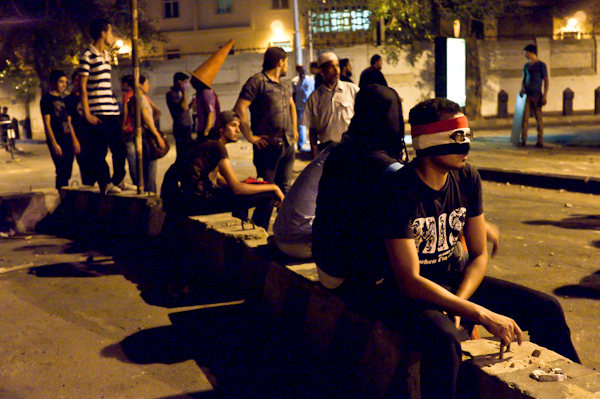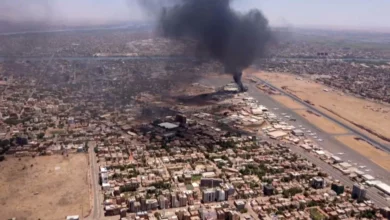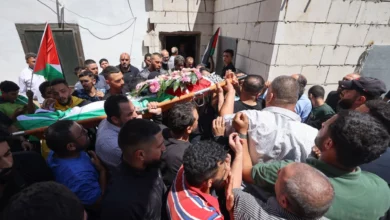
Some 300 Syrian and Egyptian activists clashed with Central Security Forces on Wednesday evening, after their attempt to raise the flag of the Syrian revolution over the embassy in Cairo was met with birdshot fire and tear gas. Barrages of stones were exchanged, injuring dozens as a six-hour long street battle was waged at the embassy and in the surrounding area.
Clashes started at around 6:45 pm as stones were lobbed at security officers, and continued for several hours.
Earlier that day, a bomb killed three of President Bashar al-Assad’s top military officials, including the defense minister, the most significant blow to Assad’s government since the outbreak of the country’s nearly 17-month-old rebellion. Fighting that followed attacks launched by the Free Syrian Army had spread throughout Damascus. This prompted protesters in Egypt to march to the Syrian Embassy in Cairo, where a standoff with the security forces eventually escalated into clashes.
Protesters, who came out in solidarity with Syrian opposition forces, were demanding Egyptian President Mohamed Morsy take a stance in favor of the Free Syrian Army, in addition to the expulsion of the Syrian ambassador and an end to the shelling and besieging of Syrian cities by the Assad regime. "Down with Bashar," and "Egypt and Syria are one," they chanted.
“The fact that they protect the embassy shows their support for Bashar al-Assad,” remarks a 20-year-old Egyptian protester who spoke on condition of anonymity. “The Syrian people are being massacred and Morsy is sitting on his chair in the meantime. We recognize none but the Free Syrian Army, and we want Morsy to take a stance.”
“This ambassador is complicit in massacres in Deir al-Zor and Idlib. He does not represent me and we want him gone,” says Abdel Aziz Ilwan, a 26-year-old Syrian from Hama who studies in Egypt.
A 23-year-old Syrian who spoke on the condition of anonymity defected from the army and fled from Aleppo seven months ago.
“Many of my friends died and I don’t know anything about my family,” he said, adding that he felt compelled to protest against Assad’s regime.
Ceasefire
Around 9 pm, a short-lived moment of calm gave protesters the chance to plead with police for the release of five protesters who had by then been detained.
“We want nothing else, we will leave if you release them”, pleaded one protester. Activist Islam Nuriddin, who had been negotiating with the security forces for the release of demonstrators, said his efforts were to no avail.
Egyptian protesters were asking Syrians to leave out of fear they would be deported.
As ultras were singing songs against the Interior Ministry, the protest transformed slowly into yet another chapter in the feud between Egyptian youth and Central Security Forces. The latter were responsible for the killing of many protesters, creating deep-seated animosity that has manifested itself in numerous violent confrontations since January 2011.
Tensions rose until fighting erupted again, taking a more violent form this time. Security forces and protesters took turns charging and retreating, as stones filled the sky for at least another four hours. This time, protesters hurled Molotov cocktails at security forces, who responded with birdshot.
After midnight, protesters were pushed back to the Kempinski Hotel on the Corniche, from where they moved up and down the side streets near the American and British embassies, where the battle now took place. Every now and then, young men sprayed with birdshot, shot with larger bullets, or wounded by rocks would run back to take cover. Single police cars passing by the protesters were attacked with rocks, shattering the windows. People dressed in plain clothes as well as police and army uniforms were seen throwing stones at protesters this time.
In the meantime, chants against the Interior Ministry became dominant, and one protester remarked that in addition to showing solidarity with the Syrian people, demonstrations show the crimes of the CSF against the Egyptian people must not be forgotten.




